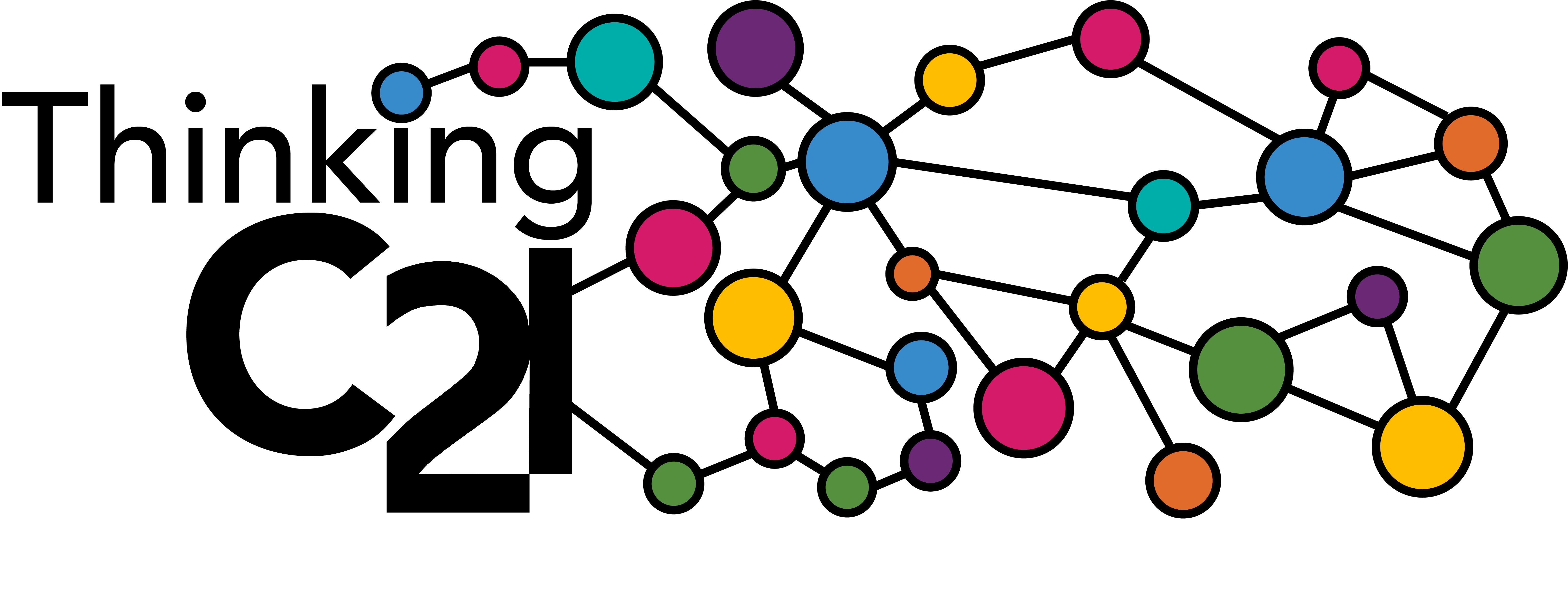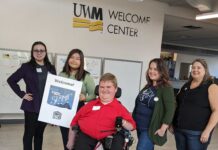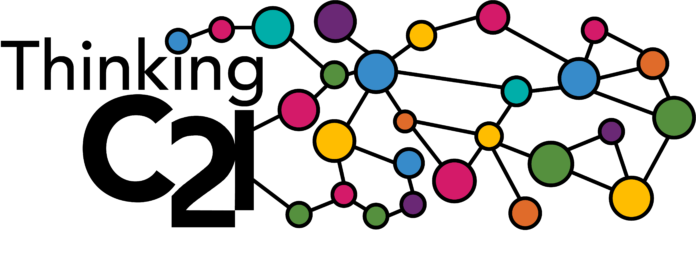By Anne Basting
When I am out and about, as I often am, and people ask, “what are you doing now?” I say:
“I direct UWM’s Center for 21st Century Studies.”
Inevitably there is a pause.
A squint.
And a “what’s that?”
Certainly, the reputation of C20 and then C21, which is now 56 years old – is well established in certain academic circles. But out and about…we were a well-kept secret.
It is my hope that after my three years as Director, part of a vibrant team at the helm of C21, there will be a few less squints and a few more people who know of the incredible work of C21 and the power of interdisciplinary, humanistic inquiry.
Knowing I would only direct C21 for three years, I shifted from a dominant director format to a team – with a Director, Lead Faculty Advisor, and a Managing Director – supported by our Business Manager and three Grad Fellows. Our weekly brainstorm meetings were filled with laughter. Together we shifted C21 toward responsiveness – taking the measure of what is top of heart and mind of our extended community and framing our programming accordingly.
Over the three years we:
- Reimagined C21 programming
- Reimagined C21 publishing
- Reimagined funding
- Reimagined C21’s spaces
- Expanded C21’s community partnerships
- Fostered collaborations through Collaboratory funding and facilitating the Humanities Alliance
- Created metrics to measure our efforts.
I highlight these here partially to marvel at just how much the team managed to accomplish in such a short time, and because we didn’t always do a good job of sharing all of what was happening on the 9th floor of Curtin Hall. I hope you all take pride and hope in what happened as well and join the new team as they continue C21’s journey to build a community of scholars to address the pressing issues of our time. Afterall, you are that community.
Our first step was to rewrite our charter to build in a team structure (ensuring that C21 wouldn’t be vulnerable to changes in staffing) and joining together our separate faculty and community advisory councils into one.
Reimagined Programming
Our goal was to build on existing interests and strengths and help them evolve. UWM continues to (and will continue to) struggle with resources. Our staff, faculty and students in turn struggle to find time for deep learning, research, and community engagement. Collaboration, which always takes more effort than working alone, needs support to thrive.
Drawing on themes in the original survey of community interests, we identified a yearning for community and connection; food and land justice issues; and concerns about democracy. Those became our themes over the three years. Lonely No More! The making and unmaking of loneliness and connection; Nourishing Trust; and Trust & The Vote.
We expanded programming options beyond lecture and traditional panels to include dialogue and short podcasts that would introduce ideas to a broad audience.
In 2022, we partnered with Milwaukee Turners to co-host our roundtable conversations, which more than tripled our reach by broadcasting on Wisconsin Eye and live streaming on Facebook.
Reimagined C21 Publishing
C21 had a rich history of publishing books out of its conference proceedings. This was when C21 had a staff position dedicated to editing. With budget cuts, those duties were falling on increasingly overloaded staff members. At the same time, academic publishing is transforming. Short, faster publications are capturing the quick evolution of ideas in the humanities. Peer review is becoming more transparent.
In the fall of 2023, C21 worked with UWM Digital Humanities to invite a prestigious panel of leaders in humanities publishing to address this issue with the aim of guiding our next steps. C21 shifted away from “book” publishing toward a wide range of transparently peer-reviewed publications – in the form of essays on the website, annotated transcripts of our roundtables, and podcasts. In addition, our Story Cart encounters, interviews with community members on the topics at the heart of our programming, are published and archived online.
Reimagined Funding
In short, we wrote grants and engaged in fundraising.
We raised $10,000 to transform the beloved C21 Seminar Room in honor of Jane Gallop’s 40-year history with C21 when she retired from UWM. We bought new tables and chairs, removed and replaced the old chalkboard with a high-tech monitor to facilitate hybrid meetings, replaced the 50-year-old track lighting, and reframed and curated C21’s poster collection.
We secured over 70K in funding from external sources, including The Greater Milwaukee Foundation; the Milwaukee Food Council (Federal SNAP education funds); The Center for Artistic Activism; and the Tommy Thompson Center for Public Leadership.
We also increased our UW System (now the Universities of Wisconsin) support of our Fellow program to two $11,000 positions.
We wrote an NEH proposal (unfunded, as most are in the first round…) and got on the radar of the Mellon Foundation with a zoom meeting and an LOI currently awaiting review.
Part of the benefit of identifying a theme to cover several years of programming is that external funding becomes possible.
We are currently working with the administration to solidify C21’s ongoing budget so that it is more – well – sensical and stable.
Reimagined Spaces
Our team’s aim was to make the 9th floor feel welcoming. We worked with Fellows to create a color palette and did some painting. We sent 50-year-old furniture to surplus and gathered some new/used pieces to create comfortable and inspiring study areas.
Summer Fellows took on the transformation of the C21 Library – which housed a random collection of books mailed to us by publishers – to a meaningful collection of books produced by C21 Fellows and affiliates. This spring we’ll unveil the new library mural, designed and painted by Debbie Sanjani and Luna, a Milwaukee Latinx artist collective. The mural will feature the names of all C21 Fellows on the spines of the books and tablets. Our hope is to give C21 alumni an opportunity to revisit us, feel honored, and take a selfie.
We transformed our main office area into a gallery that rotates annually. One of C21’s student Summer Fellows endeavored to add our gallery to the list of UWM Galleries – only to find it was woefully outdated. She updated it, created a map, and out of the collaboration emerged the first UWM Gallery Night in 2022. Another curatorial fellow created a permanent “Hallway History” exhibit of C21’s rich history.
Now, when you step off the elevator onto the 9th floor, I hope you feel welcome to join a community of scholars addressing the pressing issues of our time across multiple platforms.
Expanded Partnerships
Each year we have invited community partners to join C21’s Advisory Council. A map on the wall just outside the main office features push pins marking the location of over 30 collaborating partners. Partnerships expanded internally at UWM as well, as we sought to support and grow emergent ideas.
Our community of scholars includes people with expertise in lived experience and those trained in traditional research methodologies. Together we are co-creating knowledge.
Fostered Collaboration
“Building a community of scholars…” To do this, we aimed to boost our communication and our gathering capacity, so that people would know more about each other’s interests/concerns and could come together to explore them.
We gathered the leaders from various Humanities departments, centers, and institutes to come together to share concerns, interests, and programming efforts. The Humanities Alliance was a heart-lifting effort – and effective! It’s focus on Internships yielded a grant (secured by the SET office) for “traditionally un-funded internships”.
C21’s “Collaboratory” funding program increased from 5 applications in the first year to over a dozen in the third.
Created Metrics
C21 strives for Openness.
to be clear, transparent and learn from our mistakes.
C21 strives to be Equitable
centered on the public good, social justice, and accessibility
C21 aims for Collegiality
to build community with kindness, playfulness, respect, and generosity
C21 aims for the highest Quality in all we do
in creativity, research methods, and design/processes
We ask our Advisory Council members to complete a survey at the start and end of the year to assess how we are doing according to these measures.
It has been an incredible joy to be part of C21’s history and, I hope, its future. As an interdisciplinary humanities / arts scholar myself, whose work has been deeply community engaged, I can say that these co-creative partnerships matter. The Humanities matter. And in times of scarcity (a permanent condition at a public university), collaboration is hope.
Thank you for honoring me with your partnership.





